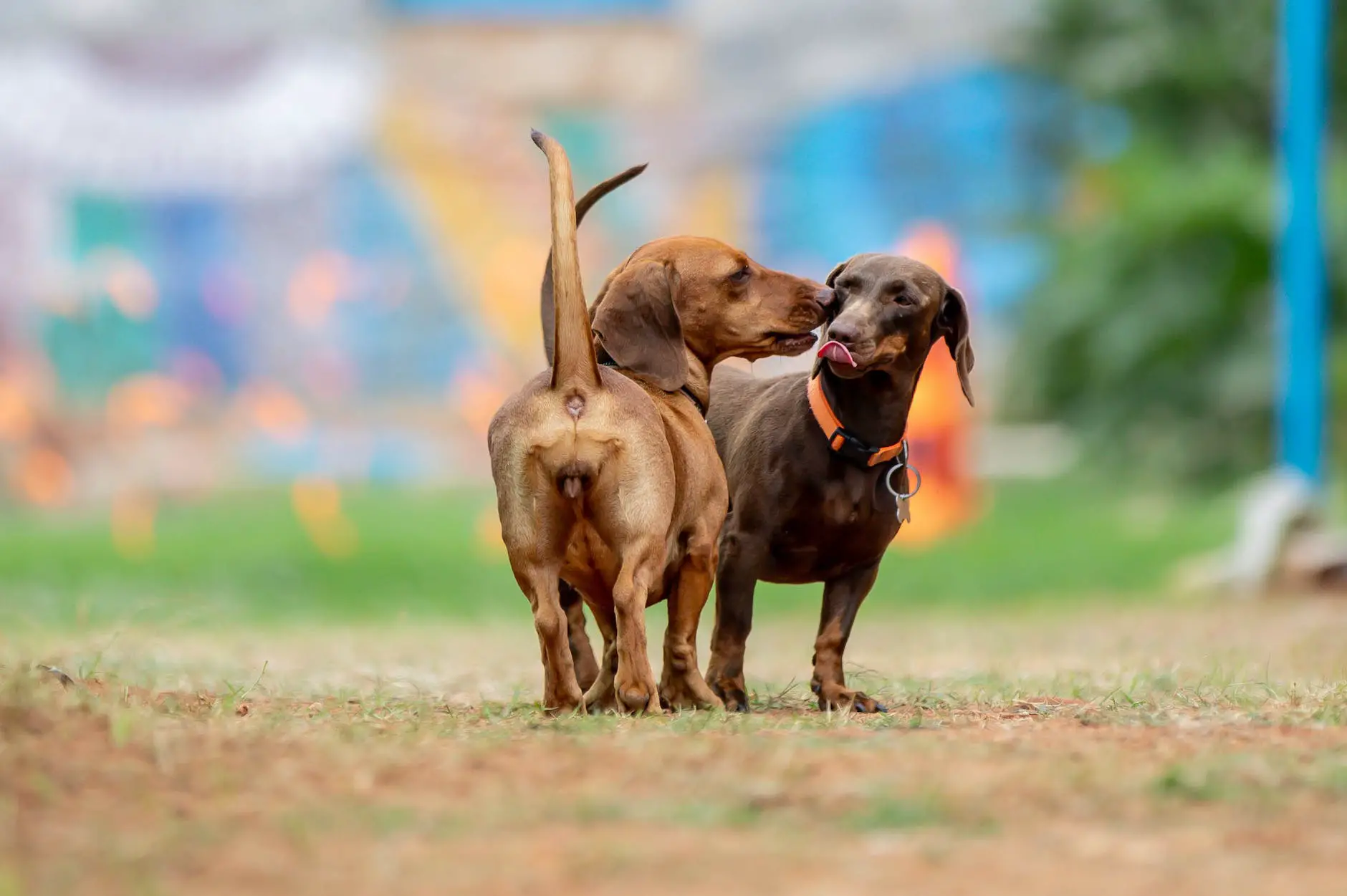It is important to do complete research before you get a dog or puppy, and know to to care for a dachshund. Here’s nine things to consider.
A good option is buying from a certified dachshund rescue center, but if decide you want a dachshund puppy you should only buy from a registered breeder.
Request to see the pup’s mom and father to know that you are adopting legitimate puppies.
Mom ought to communicate with the puppy, and you should be able to see them together. On the off chance that the dad was a stud dog, pose enquiries about him as well.
Request the registration number of both guardians so you can check them with the official AKC Dog Registration.
Things To Ask Before Purchasing Your Dachshund
Investigate the overall condition and hope to see where all the pups have been resting.
- Is his bedding clean?
- Does the little dog have toys and things to play with them?
- Does the puppy appear to be a piece of an adoring, caring home?
Go with your gut impulse and, if something does not feel right, leave.
1. Get permission
If you are renting or leasing a home, condo, or apartment, are you are permitted pets? Make sure you get permission from your proprietor or the management organization to have a dog.
2. Someone should be home to care for your dachshund during the day
Dachshunds are the most joyful being around people and should not be left alone for a long time. So this is an important point in caring for a miniature dachshund.
In case, you are not home during the day, possibly you, or somebody you know, need to see in at regular intervals and allow your dachshund out.
You may have family or companions who could care for him during the day, or you could employ a dog sitter or dog walker to monitor him.
Leaving a dachshund alone too long could lead to partition anxiety, excessive barking, or show dangerous behavior.
Some adult dachshunds do fine all alone, so it varies from dog to dog.
I bought two dachshunds so if I have to leave for a few hours, they keep each other company and don’t get stressed out.
3. Ask for the paperwork
Ask for the “kennel club” registration and “pedigree certificate” from your registered breeder. So, you can manage the transfer of ownership.
4. Ask for the insurance
You generally get insurance for a month free from your dog breeder. Try not to trust that this insurance will run out before you sort out your own.
Pet insurance agencies don’t cover you for claims in the initial 14 days, so ensure your new insurance before the breeder’s insurance runs out.
5. Ask if they have had flea and worm treatment
Ask if the dachshund was dewormed, and if or when they had their last flea treatment.
6. Ask about vaccinations
Request your dachshund’s vaccination certificate. You have to show this to your pet doctor at the first check-up. That way you can arrange follow-up vaccinations in the future.
7. Ask About The Dachshund’s Dog Food
Ask what dog food the dachshund was eating. Ask how often they feed them, and what times of the day.
The owner may give you some of their dog food to cover you for a few days until you decide which dog food you will purchase. This way you don’t have any sudden change in their dog food.
It’s better to let your dog settle into his new home first. Continue feeding the same food by the breeder and change it slowly.
8. Ask about Dachshund temperament
Get some information about the temperament of your dachshund so you can detect any changes in his energy and personality once he’s adjusting to his new home.
9. Ask about microchips
Find out whether your dachshund has been microchipped. If not, that is something to consider.
Once You Bring Your New Dachshund Home
Here is a checklist on how to care for a dachshund when you bring your new dachshund home
Protect Your Puppy
Anything toxic for your dog you want to keep out of reach including newspapers. Plus, shoes, purses, and significant things are stored so they won’t be accessed.
Health Concerns
Like other dog breeds, Dachshunds are more prone to medical problems like obesity, diabetes, joint issues, decreased stamina, and back issues like Intervertebral Disc Disease (IVDD).
Most dachshunds are exceptionally healthy and live a long time (usually 12-17 years).
However, if you want to care about your dachshund, you should know about the needs and history of the breed.
How To Care For A Dachshund To Prevent Back Injuries
Dachshunds are friendly and active dogs. Because of their long backs, they can get injure themselves when jumping up and down on furniture, particularly when they are overweight.
This is a good reason to get a ramp so your little companion can securely get up and down furniture.
Likewise, when picking up your dachshund, you need to ensure you hold their chest and base so you don’t put any added pressure on their backs and perhaps harm them.
Feeding A Dachshund
Dachshunds are consistently hungry and will eat anything. It is easy to overfeed them and cause them to get overweight.
An overweight dachshund is inclined to various serious diseases, like diabetes and joint or back injury.
So, you must ensure that your dachshund gets the right and healthy amount of dog food. The amount of feed and nutrients will depend on age, size, and activity level.
Ordinarily, it will be between 1/2 – 1 1/2 cups of dry food. However, always consult with your veterinarian about the amount and healthy feed for your dog.
If you are purchasing any dog food brand to feed your dachshund, carefully read the label and ingredients.
The first ingredients that should be named are meat, for example, chicken, beef, or sheep, avoid from nonexclusive “meat” marking as they could be anything.
You have also checked the ingredients, to ensure that they are natural and don’t have additives.
Bedding
Dachshunds need a clean and comfortable calm area to be able to rest separated from all the drafts and off the floor.
You will want to purchase a good-quality puppy bed. You can put in a clean sheet or pillow in the resting area as extra padding.
Wash your dachshund’s bed covering frequently.
If the dachshund will invest a ton of time outside, be careful your dog easily approached plenty of cool and clean water, and shade in a hot climate, and a warm, dry, covered area throughout the winter.
Grooming
Dachshunds are medium to low-maintenance dogs, smooth dachshunds have short, gleaming hair and are simple to maintain. Long-haired and wire-haired dachshunds need to be groomed regularly.
For all types of Dachshunds, you need to clean and check their floppy ears, as they can develop an excessive amount of wax. Using a cotton ball around the outside of the ears will be sufficient.
Their nails should be trimmed regularly to avoid splitting.
Their teeth need brushing a few times each week.
Dachshund activity and walk
Dachshunds are energetic, cherishing, playful, loving, and have a lot of stamina. They need moderate action and love to burrow and play outside.
Each canine has an individual energetic level, but 20 min walk a day, or a one mile daily walk has sufficient for your dachshund to have a sound and healthy life.
Dachshunds love to play catch, so you can throw them a ball or toy inside for a short time.
Dachshund Tick and Fleas Care
In hot weather, you need to perform a daily inspection of your dachshund for ticks and fleas. Make sure you give them a flea and tick medicine, such as Frontline, or Nexguard.
If your dachshund does get a tick, there are strategies for tick removal.
Always consult with your veterinarian in case of a tick and a flea infestation.
Checklist of Dachshund Supply
- High-quality food prepared for Dachshund
- Always supply safe toys that can be chewed easily
- Water bowl
- Food bowl
- Dog collar with identified tag and license
- Brush and comb for grooming and bathing
- Training crate
- Leash
- Dog carrier
- Dog toothbrush
- Nail trimmer
- Dog bed with towel and blanket
Things That Are Bad For Dachshund Health
The following food item should never be offered for your Dachshund
- Moldy and spoiled food
- Salt or salty food
- Yeast dough
- Garlic, Onion, and chives
- Resins and grapes
- Alcohol, wine, and bear
- Coffee, tea, and chocolate
- Tomatoes and unripe fruit and stem
- The bone of chickens and other animals
What To Expect When Getting a Dachshund Puppy
Your dachshund puppy will start teething and chewing, which will last for about eight months.
Check with your vet on your dachshund puppy’s vaccinations as they will need this around 14-16 weeks.
Once they get their vaccinations, you can take your dachshund puppy out for short walks in the yard, or even at a park.
Just don’t overdo it as puppies should only be exercised for five minutes per month of age, which is a good rule of thumb.
Once they are 12 months of age, you can exercise them more.
You can start socializing them with other dogs and people so they get used to other pets and people.
During the puppy stage, you will want to spend a lot of time with them and this can be a lot of fun as they will make you laugh.
It can also be frustrating when trying to potty train them as they can be difficult unless you are consistent and do the proper dachshund puppy training methods.
So those are the things you need to know for dachshund care now that you made a dachshund a part of your family.
Just remember to give them a lot of attention and in return, they will give you a lot of love


